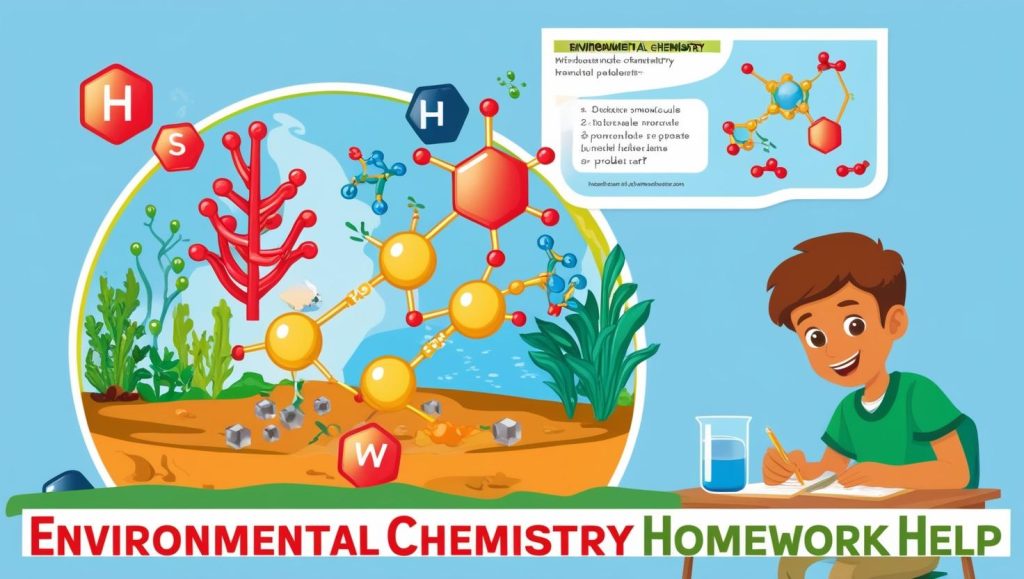Introduction
Environmental chemistry is a multidisciplinary field that examines the chemical processes occurring in the environment, including the air, water, and soil. It focuses on how pollutants interact with natural ecosystems and the strategies used to mitigate environmental damage.
Many students find environmental chemistry challenging due to its combination of organic and inorganic chemistry, toxicology, biochemistry, and environmental science. If you’re struggling with assignments, seeking Environmental Chemistry homework help can improve your understanding of key concepts, research methodologies, and problem-solving skills.

This guide covers fundamental topics in environmental chemistry, essential study resources, and expert strategies for excelling in your coursework.
What is Environmental Chemistry?
Environmental chemistry studies the presence, movement, and effects of chemicals in the environment. It helps us understand:
- How pollutants affect air, water, and soil.
- The chemical reactions that occur in ecosystems.
- Strategies for pollution prevention and remediation.
- The role of chemistry in sustainable development.
Importance of Environmental Chemistry
Environmental chemistry is essential for addressing major global challenges such as climate change, pollution, and resource depletion. Professionals in this field contribute to:
- Water quality management (ensuring safe drinking water).
- Air pollution control (reducing emissions from industries and vehicles).
- Hazardous waste management (developing eco-friendly disposal methods).
- Sustainable energy development (researching renewable energy sources).
External Resource:
- American Chemical Society (ACS) – Environmental Chemistry Division – A hub for research and resources on environmental chemistry.
Key Topics in Environmental Chemistry
If you’re looking for Environmental Chemistry homework help, you might encounter the following topics:
1. Atmospheric Chemistry
Atmospheric chemistry studies the composition and reactions occurring in the Earth’s atmosphere. It includes:
- Greenhouse gases and their impact on climate change.
- Ozone depletion and stratospheric reactions.
- Air pollution sources and mitigation strategies.
External Resource:
- NASA Climate Change – Provides research on greenhouse gases and global warming.
2. Water Chemistry
Water chemistry focuses on the chemical properties of natural and treated water, including:
- pH, dissolved oxygen, and salinity levels.
- Heavy metal contamination and their effects.
- Water treatment processes and desalination.
3. Soil Chemistry
Soil chemistry examines the interactions between minerals, organic matter, and contaminants. Key topics include:
- Acid rain and soil degradation.
- Nutrient cycles (nitrogen, phosphorus, and carbon cycles).
- Pesticides and their environmental impact.
4. Toxicology and Pollutants
Environmental toxicology deals with the effects of chemical pollutants on human health and ecosystems. Common pollutants include:
- Heavy metals (lead, mercury, arsenic).
- Pesticides and industrial chemicals.
- Plastic waste and microplastics.
External Resource:
- EPA Toxicology Database – A government database on toxic substances and pollution data.
5. Waste Management and Recycling
Sustainable waste management strategies focus on:
- Biodegradable vs. non-biodegradable waste.
- Recycling and waste-to-energy conversion.
- Hazardous waste disposal and e-waste management.
How to Approach Environmental Chemistry Assignments
1. Understand the Assignment Requirements
Before starting your homework, ensure you:
- Identify whether it’s a research-based or calculation-based assignment.
- Break down complex concepts into smaller sections.
- Use scientific databases and peer-reviewed journals for credible sources.
2. Use Reliable Study Resources
Since environmental chemistry involves technical data, using reliable sources is essential.
Recommended Resources:
3. Organize Your Homework Effectively
Introduction
- Define environmental chemistry and its significance.
- Explain the scope of the topic covered in the assignment.
Main Body
- Provide theoretical explanations and real-world examples.
- Include case studies on pollution incidents.
- Discuss environmental laws and regulations related to the topic.
Conclusion
- Summarize key findings.
- Highlight the importance of environmental chemistry in daily life.
Challenges in Environmental Chemistry & How to Overcome Them
1. Complex Chemical Reactions
Environmental chemistry involves reaction mechanisms and equilibrium equations that can be difficult to understand.
Solution: Use interactive visual tools like:
- ChemCollective – A platform for virtual labs and simulations.
2. Data Analysis & Interpretation
Assignments may require analyzing pollution data and statistical trends.
Solution: Use online tools like:
- EPA’s Environmental Data – For real-world pollution datasets.
3. Keeping Up with Environmental Regulations
Environmental policies and laws change frequently.
Solution: Follow environmental agencies such as:
- United Nations Environment Programme (UNEP) – For the latest global policies.
Top Platforms for Environmental Chemistry Homework Help
If you need additional Environmental Chemistry homework help, consider these platforms:
- Khan Academy – Offers free educational videos on chemistry topics.
- Coursera – Provides environmental chemistry courses from top universities.
- Chegg Study – Access textbook solutions and tutoring.
- ScienceDirect – Browse peer-reviewed environmental chemistry research papers.
Tips to Excel in Environmental Chemistry
1. Stay Updated with Environmental News
Reading environmental reports and case studies will enhance your understanding of real-world applications.
2. Engage in Practical Experiments
Performing lab experiments related to water testing, air quality analysis, and soil sampling helps reinforce theoretical knowledge.
3. Join Study Groups & Online Forums
Collaborate with peers and join online communities like:
- Reddit r/environmental_science
- LinkedIn Environmental Chemistry Groups
4. Practice Problem-Solving Skills
Work on practice problems related to chemical reactions, pollution analysis, and regulatory compliance.
Conclusion
Environmental chemistry plays a crucial role in understanding and solving pollution, climate change, and sustainability challenges. With the right study strategies, resources, and expert guidance, students can master this subject and contribute to environmental conservation efforts.
If you need Environmental Chemistry homework help, utilize the available online platforms, research tools, and expert tutoring services to enhance your learning experience.


